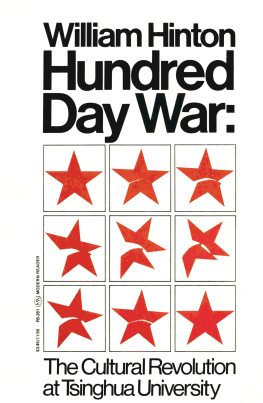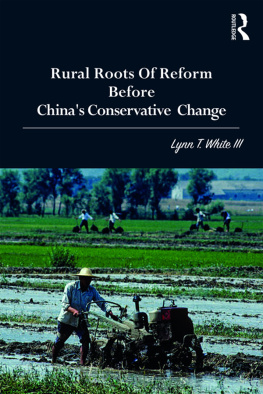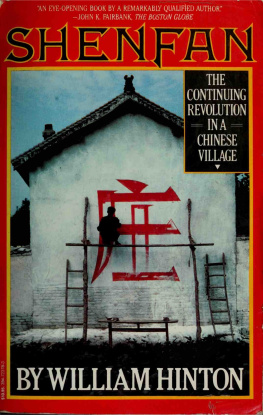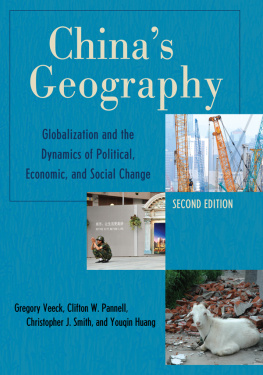Thank you for buying this ebook, published by NYU Press.
Sign up for our e-newsletters to receive information about forthcoming books, special discounts, and more!
Sign Up!
About NYU Press
A publisher of original scholarship since its founding in 1916, New York University Press Produces more than 100 new books each year, with a backlist of 3,000 titles in print. Working across the humanities and social sciences, NYU Press has award-winning lists in sociology, law, cultural and American studies, religion, American history, anthropology, politics, criminology, media and communication, literary studies, and psychology.
WILLIAM HINTON was born in Chicago in 1919. He first visited China in 1937 and in 1945 served as a propaganda analyst for the United States Army office of War Information in Kuming, Chongqing, Hankou, and Shanghai. In 1947 he served as a tractor technician for the United Nations Relief and Rehabilitation Administration, and began to teach English at a rural university. Hinton soon found himself engulfed in the growing land reform movement sweeping through China. He accompanied a Communist Party work team to the village of Changzhuang (Long Bow) in central Shanxi province, to observe and record this extraordinary process of social reform. When he returned to the United States in 1953, McCarthyism was running rampant, and Hintons notes and diaries were seized by U.S. Customs officers. It would take three years of legal maneuvering by the United States Senate Internal Security Committee. After another lawsuit lasting nearly two years and costing over $6,000, Hinton finally won possession of his papers in 1958, but was denied a passport and forbidden to leave U.S. soil. In 1968 his passport was returned, but Hinton was unable to visit China due to the turmoil of Maos Cultural Revolution. Beginning in 1971, Hinton returned to China frequently as an agricultural consultant with local and international agencies, including the United Nations Food and Agriculture Organization, where he helped bring mechanization and farm equipment to selected villages. He has authored numerous books, including Hundred Day War: The Cultural Revolution at Tsinghua University (1972), Turning Point in China: An Essay on the Cultural Revolution (1972), Shenfan (1983), and The Great Reversal: The Privatization of China, 1978-1989 (1989). His final book, Through a Glass Darkly: U.S. Views of the Chinese Revolution (2006), was published posthumously. William Hinton died in 2004.

FANSHEN
A Documentary of Revolution in a Chinese Village
FANSHEN
A Documentary
of Revolution
in a Chinese Village
William Hinton

Copyright 1966, 2008 by Monthly Review Press
All Rights Reserved
Cover illustration is taken from the first edition of Fanshen
Library of Congress Cataloging-in-Publication Data
Available from the publisher
ISBN: 978-1-58367-175-7 (paper)
Monthly Review Press
146 West 29th Street, Suite 6W
New York, NY 10001
www.monthlyreview.org
10 9 8 7 6 5 4 3 2 1
Fanshen after Forty Years
Fred Magdoff
History does not refer merely...to the past. On the contrary, the great force of history comes from the fact that we carry it within us, are unconsciously controlled by it in many ways, and history is literally present in all we do.
James Baldwin
Why publish a new edition of Bill Hintons Fanshen in 2008? This is certainly a legitimate question considering the numerous changes and reversals of priorities that have occurred in China in the four decades since it was originally published and some sixty years after the events described in the book. Clearly unanticipated at the time of writing Fanshen, China is now well along the capitalist road under the leadership and control of the Communist Party. The short answer to the question of why republish Fanshen is that it is a remarkable book that has relevance today not only for China and students of history and social change, but for much of the third world.
Fanshen is one of the most important books written about the revolution in China. In fact, just the story of how Hintons book came into beingoriginally published by Monthly Review Press in 1966is quite an epic tale itself. Bill literally carried his notes on his back as he walked out of Taihang Mountains in 1948 (attacked by the Kuomintang cavalry and airplanes on the way) only to have all his materials confiscated by the U.S. government when he reentered the United States in 1952. Bill went through a long legal battle to gain their release, was called to appear before the Senate Internal Security Committee, finally obtained the release of his notes in 1958, and then spent years writing and searching for a publisher. It was subsequently published in numerous languages and read by hundreds of thousands of people around the world interested in events in revolutionary China and what it might have to say about their own countries.
Land reform, designed to dismantle feudal power and exploitation, was central to the Communist wartime agenda. It became policy mainly because it was the only way to quickly help the poorest rural dwellers (and almost all of Chinas population was rural at the time). But it was carried out initially in wartimethe period described in Fanshenpartially because of its power to demonstrate to the peasants that they had something to fight for and would therefore have a direct stake in helping the Eighth Route Army defeat the Japanese as well as the Kuomintang. (This is not dissimilar to the motivation behind Lincolns Emancipation Proclamation during the U.S. Civil War, aimed partially to galvanize slaves to flee Southern plantations and fight for the North.)
The term fanshen literally means to turn over. Hinton uses the term as it was used at the time to describe a literal turnover of resources as well as a transformation of power. It refers to the throwing off of the yoke of the landlords and the transferring of landas well as housing, farm implements, carts, work animals, clothingfrom the more wealthy villagers to the landless and poor peasants.
Hintons masterpiece deals with the momentous changes that occurred during the land reform turn over in Long Bow villagewith a population of about 1,000 that had less than 1,000 acres of arable landin North Central Chinas Shanxi Province following the takeover by the Communist army, but before the country was completely liberated. Fanshen is essentially a documentary of life and transformation in Long Bow from 1946 through much of 1948. The reader becomes familiar with key participants, their physical appearances, backgrounds, foibles, and struggles. Hinton is outstanding in his perception of people and events and is able to portray a vivid picture of events in all their complexities. The reader also learns not only the larger issues and struggles and some of the history leading to the land reform but also gets to know the real human beings involved in the strugglesin all their humanness. Bill portrays their actions as encompassing the full range of human behavior, from the most altruistic to the most selfish.
Villages in the areas of northern China under control of revolutionary forces had undergone a first attempt at land reform in 1946-1947. This was an often chaotic and sometimes brutal affairas old scores were settled frequently with violence, mistakes were made, and advantages were taken by many of those in authority. The Communist Party decided to study a sample of eleven villages in the county in which Hinton was working to see how well the policies had been accomplished, correct mistakes made during the process, and assist in developing policy for the remaining villages in the region. Hinton received permission to join the work party that was assigned to Long Bow, a village not far from the university where he was teaching. The work team assigned to the task of reviewing the situation and helping the village correct its course was led to believe that Long Bow was an especially troubled village that had made many mistakes in carrying out the Draft Agrarian Law. (It
Next page







